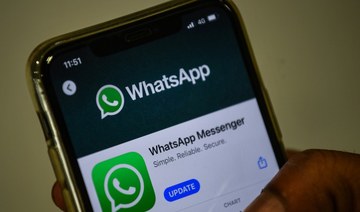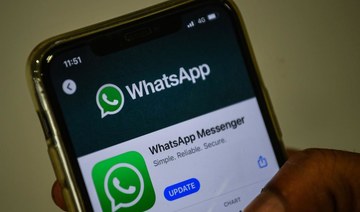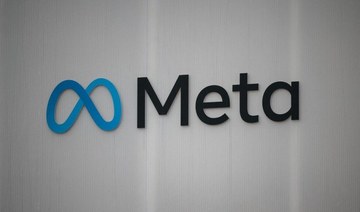SAN FRANCISCO: WhatsApp on Friday postponed a data-sharing change as users concerned about privacy fled the Facebook-owned messaging service and flocked to rivals Telegram and Signal.
The smartphone app, a huge hit across the world, canceled its February 8 deadline for accepting an update to its terms concerning sharing data with Facebook, saying it would use the pause to clear up misinformation around privacy and security.
"We've heard from so many people how much confusion there is around our recent update," WhatsApp said in a blog post.
"This update does not expand our ability to share data with Facebook."
It said it would instead "go to people gradually to review the policy at their own pace before new business options are available on May 15."
WhatsApp's new terms were unpopular among users outside Europe who do not accept that they were given a deadline to be cut off from the service.
The update concerns how merchants using WhatsApp to chat with customers can share data with Facebook, which could use the information for targeted ads, according to the social network.
"We can't see your private messages or hear your calls, and neither can Facebook," WhatsApp said in an earlier blog post.
"We don't keep logs of who everyone is messaging or calling. We can't see your shared location and neither can Facebook."
Location data along with message contents is encrypted end-to-end, according to WhatsApp.
"We're giving businesses the option to use secure hosting services from Facebook to manage WhatsApp chats with their customers, answer questions, and send helpful information like purchase receipts," WhatsApp said in a post.
"Whether you communicate with a business by phone, email, or WhatsApp, it can see what you're saying and may use that information for its own marketing purposes, which may include advertising on Facebook."
Encrypted messaging app Telegram has seen user ranks surge on the heels of the WhatsApp service terms announcement, said its Russia-born founder Pavel Durov.
Durov, 36, said on his Telegram channel this week that the app had over 500 million monthly active users in the first weeks of January and "25 million new users joined Telegram in the last 72 hours alone."
WhatsApp boasts more than two billion users.
"People no longer want to exchange their privacy for free services," Durov said without directly referring to the rival app.
Encrypted messaging app Signal has also seen a huge surge in demand, helped by a tweeted recommendation by billionaire tech entrepreneur Elon Musk.
In India, WhatsApp's biggest market with some 400 million users, the two apps gained around four million subscribers last week, financial daily Mint reported, citing data from research firm Sensor Tower.
WhatsApp has sought to reassure worried users in the South Asian country, running full-page adverts in Wednesday's newspapers, proclaiming that "respect for your privacy is coded into our DNA".
Telegram is a popular social media platform in a number of countries, particularly in the former Soviet Union and Iran, and is used both for private communications and sharing information and news.
Durov said Telegram has become a "refuge" for those seeking a private and secure communications platform and assured new users that his team "takes this responsibility very seriously."
Telegram was founded in 2013 by brothers Pavel and Nikolai Durov, who also founded Russia's social media network VKontakte.
Telegram refuses to cooperate with requests from authorities to hand over encryption keys, which resulted in its ban in several countries, including Russia.
Last year, Russia announced that it will lift its ban on the app after more than two years of unsuccessful attempts to block it.
WhatsApp delays data sharing change after backlash
https://arab.news/4jj8j
WhatsApp delays data sharing change after backlash
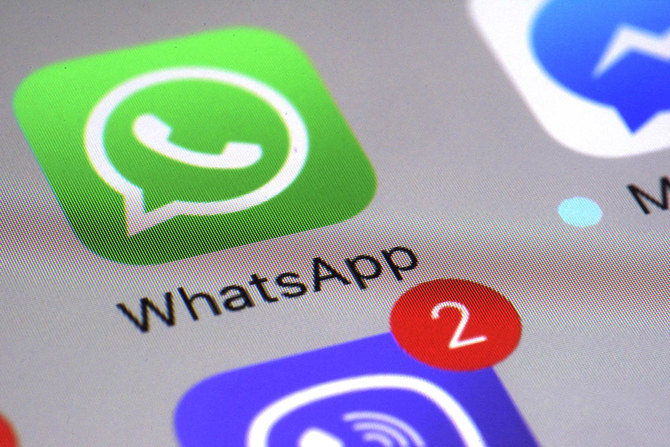
- WhatsApp canceled its February 8 deadline for accepting the tweak to its terms of service
- The platform said it would instead “go to people gradually to review the policy at their own pace before new business options are available on May 15”
Israeli officials seize AP equipment and take down live shot of northern Gaza, citing new media law

- Authorities accuse AP of providing images to Al Jazeera
- The seizure followed a verbal order Thursday to cease the live transmission, which the news organization refused to do
The Qatari satellite channel is among thousands of clients that receive live video feeds from the AP and other news organizations. The AP denounced the move.
“The Associated Press decries in the strongest terms the actions of the Israeli government to shut down our longstanding live feed showing a view into Gaza and seize AP equipment,” said Lauren Easton, vice president of corporate communications at the news organization. “The shutdown was not based on the content of the feed but rather an abusive use by the Israeli government of the country’s new foreign broadcaster law. We urge the Israeli authorities to return our equipment and enable us to reinstate our live feed immediately so we can continue to provide this important visual journalism to thousands of media outlets around the world.”
Officials from the Communications Ministry arrived at the AP location in the southern town of Sderot on Tuesday afternoon and seized the equipment. They handed the AP a piece of paper, signed by Communications Minister Shlomo Karhi, alleging it was violating the country’s foreign broadcaster law.
Shortly before the equipment was seized, it was broadcasting a general view of northern Gaza. The AP complies with Israel’s military censorship rules, which prohibit broadcasts of details like troops movements that could endanger soldiers. The live shot has generally shown smoke rising over the territory.
The seizure followed a verbal order Thursday to cease the live transmission — which the news organization refused to do.
“In accordance with the government decision and the instruction of the communications minister, the communications ministry will continue to take whatever enforcement action is required to limit broadcasts that harm the security of the state,” the ministry said in a statement.
Israeli officials used the law to close down the offices of the Qatar-based broadcaster on May 5 as well as confiscating the channel’s equipment, banning its broadcasts, and blocking its websites.
Israel has long had a rocky relationship with Al Jazeera, accusing it of bias against the country. Israeli Prime Minister Benjamin Netanyahu has called it a “terror channel” that spreads incitement.
Al Jazeera is one of the few international news outlets that has remained in Gaza throughout the war, broadcasting scenes of airstrikes and overcrowded hospitals and accusing Israel of massacres.
The war in Gaza began with a Hamas attack in Israel that killed 1,200 people and saw 250 others taken hostage. More than 35,000 Palestinians have been killed since then, according to Gaza’s Health Ministry, which doesn’t distinguish between civilians and combatants in its count.
Media watchdog ‘welcomes’ arrest warrants for Hamas and Israeli leaders

- ICC’s action is a promise to end impunity for the deaths of journalists, says Committee to Protect Journalists
LONDON: The Committee to Protect Journalists welcomed the International Criminal Court’s announcement on Monday that it was seeking arrest warrants for leaders of both Hamas and Israel.
Israeli Prime Minister Benjamin Netanyahu, Defense Minister Yoav Gallant, and Hamas leaders Yahya Sinwar, Mohammed Diab Ibrahim Al-Masri, and Ismail Haniyeh might face prosecution for war crimes and crimes against humanity.
“The ICC’s application for arrest warrants for crimes against humanity in Israel and Palestine recognizes atrocities committed against civilians,” said CPJ CEO Jodie Ginsberg.
“The civilian deaths include an unprecedented number of journalists killed since Oct. 7. The ICC’s action is a promise for an end to the impunity that has historically plagued the killing and persecution of those who write the first draft of history.”
Over 100 journalists and media workers have been killed since the beginning of the conflict last October, the vast majority of them in Gaza by Israeli forces.
CPJ reported that the conflict has claimed the lives of more journalists in three months than have ever been killed in a single country over an entire year since record-keeping began, underscoring the tragic toll this war has had on journalists.
The watchdog, along with corroborating investigations by Reuters, AFP, and Human Rights Watch, has documented at least three instances of journalists killed by Israeli forces that involved deliberate targeting.
An additional 10 cases may also involve deliberate targeting, which, according to international law, could constitute war crimes.
CPJ has urged the ICC to investigate these killings and called on Israel to grant investigators unrestricted access to Gaza, highlighting a disturbing pattern of systematic killings of Palestinian journalists that have consistently gone unpunished.
The announcement of potential arrest warrants for Netanyahu was met with strong reactions.
Netanyahu called the decision “a moral outrage of historic proportions,” while US President Joe Biden rejected the ICC’s application altogether, adding that “there’s no equivalence between Israel and Hamas.”
Meta Oversight Board set to rule on ‘genocide’ video case, two others

- Meta submitted cases as part of goal to create policy on criminal allegations based on nationality
- Decision to help Meta better navigate critical questions at a crucial time, board spokesperson told Arab News
LONDON: The Meta Oversight Board announced on Tuesday that it is reviewing three cases, including one involving a user accusing Israel of committing “genocide” and another concerning a Facebook comment in Arabic.
Meta, which submitted the cases as part of its review system aimed at creating a policy on criminal allegations based on nationality, said it removed the posts for breaching its Hate Speech Community Standards.
The first case involves a user’s reply on Threads, featuring a video that includes accusations of “genocide” and claims that “Israelis are criminals.”
The other two cases involve a December speech in which a user called all Russians and Americans “criminals” and a recent post in which a user stated that “all Indians are rapists.”
An Oversight Board spokesperson told Arab News: “Tensions in the region, and increasingly around the world, are dominating the discussion online.
“It’s vitally important that when looking at these issues, Meta gets the balance right and works to protect safety, without unduly limiting the ability of people to speak out about the abuses they see or the frustration they experience.”
The spokesperson added that while the board cannot review every appeal, it selects those of critical importance to public discourse “to help Meta better navigate these critical questions at a crucial time.”
Meta said the three posts were removed after human review for “targeting people with criminal allegations based on nationality.”
Despite its decision, Meta referred the cases to the Oversight Board to address the challenge of handling criminal allegations directed at people based on their nationality, as they might be interpreted as attacks on a nation’s policies.
The board’s decision to review these cases comes as social media platforms have seen an uptick in violent, hateful, and misleading content since the start of Israel’s war on Gaza last October.
The Oversight Board reported a nearly 2,000 percent increase in appeals from the region in the first three weeks after Oct. 7, with many complaints about content inciting violence and promoting hate speech.
The moderators have called for public comments addressing the platform’s hate speech policy in relation to users’ ability to speak out against state actions during times of conflict and Meta’s human rights responsibilities in relation to content targeting users based on nationality.
They also requested insights into potential criteria for determining whether a user is targeting a concept or institution rather than people based on nationality.
In the coming weeks, the board members will deliberate on the cases.
Facebook and its parent company Meta have previously been accused of deliberately censoring pro-Palestine content. Human Rights Watch stated last December that Meta routinely engages in “six key patterns of undue censorship” of pro-Palestine posts.
Recently, the board introduced a new 30-day expedited review mechanism and will rule on whether the pro-Palestinian phrase “from the river to the sea” is considered “acceptable” speech.
In April, the board overturned Meta’s decision to leave up a Facebook post claiming that Hamas originated from the population of Gaza, comparing them to a “savage horde,” leading Meta to take the post down.
Report: Meta approved anti-Muslim political ads in India

- ICWI and Eko found Meta’s system failed to detect prohibited content in most cases
- Indian election sees surge in anti-Muslim, Hindu supremacist sentiment
LONDON: Tech giant Meta approved political advertisements on its platforms inciting violence and hate speech during India’s general election, a report released on Monday revealed.
The investigation, conducted by non-sectarian diasporic organization India Civil Watch International and corporate watchdog Eko, found that Meta, the parent company of Facebook and Instagram, allowed AI-manipulated political ads that spread disinformation and incited religious violence, particularly targeting Muslims.
The report found that Meta’s system failed to prohibit a series of inflammatory ads designed to mimic real-life scenarios, uploaded by ICWI and Eko.
The ads, submitted to Meta’s ad library, contained slurs towards Muslims in India, such as “let’s burn this vermin” and “Hindu blood is spilling, these invaders must be burned.”
Another ad featured Hindu supremacist language and false claims about political leaders, including an opposition leader allegedly wanting to “erase Hindus from India” and calling for their execution.
According to the report, all of the adverts “were created based upon real hate speech and disinformation prevalent in India, underscoring the capacity of social media platforms to amplify existing harmful narratives.”
Out of 22 ads submitted in English, Hindi, Bengali, Gujarati and Kannada, 14 were approved by Meta, while a further three were approved after minor tweaks that did not alter the overall provocative messaging.
Only five ads were rejected for violating Meta’s community standards on hate speech and violence.
The ads, which largely targeted Muslims, were immediately removed after approval by ICWI and Eko.
The organizations accused Meta of profiting from hate speech and failing to uphold its pledge to prevent AI-generated or manipulated content from spreading on its platforms during the Indian election.
Campaign spending for India’s elections, the largest and longest in the world, is estimated to reach $16 billion.
The report also claims that the approved ads violated India’s election rules, which ban election-related content 48 hours before polling begins and during voting.
Meta, which requires vetting approval for accounts running political ads, had already faced controversy during this year’s Indian elections.
A previous report by ICWI and Eko found that surrogate or “shadow” accounts aligned with political parties paid vast sums of money to disseminate unauthorized political ads on platforms.
Some approved accounts for running political ads were even up for sale in public Facebook groups with tens of thousands of members.
Many of these real ads endorsed Islamophobic tropes and Hindu supremacist narratives.
The tech giant has struggled for years with the spread of Islamophobic content on its platforms, raising concerns about Meta’s ability to enforce its policies and control the situation amid rising anti-Muslim sentiment in India.
Food delivery app HungerStation and Snapchat launch AR treasure hunt in Saudi Arabia

- Companies say the sponsored treasure hunt is a world first
- Great AR Hungerhunt is part of HungerStation rebranding campaign
LONDON: Food delivery app HungerStation has partnered with social media provider Snapchat to launch an immersive augmented reality treasure hunt on the platform.
The two companies said on Monday that the Great AR Hungerhunt, using Snapchat’s geofenced AR objects technology, is the first sponsored digital treasure hunt of its kind in Saudi Arabia and the world.
“Celebrating our rebranding with Snapchat marks a significant step in our journey of creativity and innovation,” said Mohammed Jifri, chief marketing officer of HungerStation.
“Through this partnership, we’re not just delivering food, but also delivering unforgettable digital experiences to our users.”

The initiative is part of HungerStation’s rebranding campaign following its $297 million acquisition by German multinational Delivery Hero in July 2023.
A leading food delivery app in Saudi Arabia, HungerStation unveiled its new brand identity in January.
HungerStation’s director of brand and communication, Ahmad Chatila, said the campaign merges technological innovation with marketing opportunities with the aim to connect the brand with youth by “offering a real-life experience and amazing game challenges.”
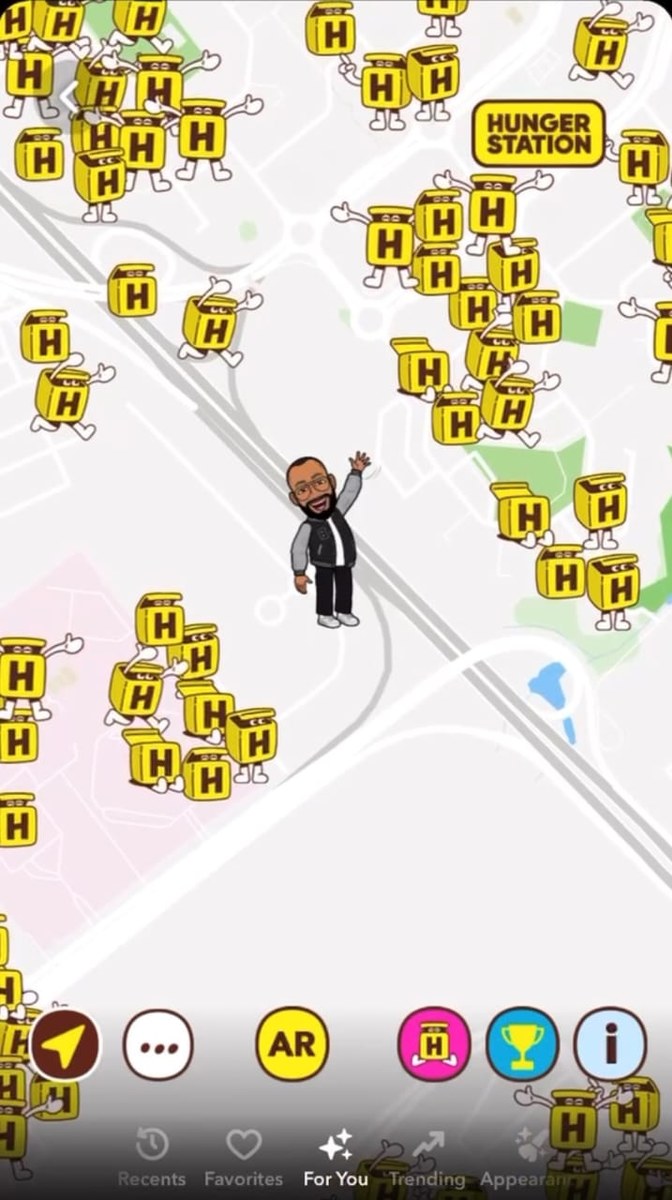
To participate, Snapchat users need to search for and collect HungerStation’s new branded boxes hidden around city maps to gain points using the AR map feature on Snapchat.
For users not based in Jeddah or Riyadh, a non-location minigame version is available that allows them to collect points too.



